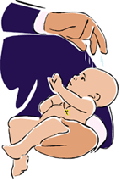

Holy Trinity
Amblecote

Baptism
Baptism is a sacrament – a sign of the love of God. Through baptism we are publicly thanking Him for his gift of life and acknowledging his love. As parents you are starting your child on a journey of faith and asking for the support of the Church.
However Baptism is not confined to infants it can happen at any age, what matters is that those concerned believe it is right to ask for baptism. Teenagers and adults may be baptised. Although you can only be baptised once there are ways of renewing your commitment publicly as an adult and the Parish Priest will be happy to advise you.
Baptism takes place usually on the first and third Sundays of each month.
To make enquiries and arrangements please telephone the Vicar on
01384 394057 or email fr.alan.williams@gmail.com.
This would normally be followed by a Baptism preparation evening.
Some frequently asked questions
Who can be married at Holy Trinity?
The law on who can be married in Church has recently changed. You are entitled to be married here if one or other of you:-
- has at any time lived in the parish for a period of at least 6 months
- was baptised in the parish concerned
- was prepared for confirmation in the parish
- has at any time regularly gone to normal church services in the parish church for a period of at least 6 months
If one of your parents, at any time after you were born:-
- has lived in the parish for a period of at least 6 months
- has regularly gone to normal church services in the parish church for a period of at least 6 months
- or If one of your parents or grandparents:-
was married in the parish
What are Banns of Marriage?
The preliminary to getting married in the Church of England is by banns. You must have your banns read out in church for three Sundays during the three months before your wedding day. This is usually done over three consecutive Sundays. Banns are an announcement of your intention to marry and a chance for anyone to put forward a reason why the marriage may not lawfully take place. Banns are read in the parish where each of you lives as well as at the church in which you are to be married if that is in another parish.
At what age can we marry?
If you are under the age of eighteen, you must have your parents’ consent to marry.
What are the costs involved?
There are centrally fixed fees which cover the publication of banns (with a certificate if this is necessary), the service itself and a certificate of marriage. These do not cover extras such as the choir, organist, bells and video recording which are all charged separately.
What kind of service can we have?
It is for you to decide whether to have a service in traditional language or one which uses more modern language.
Which hymns and songs shall we have?
The choice is yours but the priest can advise on suitable hymns as well as music for coming in, going out and during the signing of the register. Click here for a list of popular hymns.
How many rings should we have?
The decision whether to have just one ring or two is entirely yours.
Can we have a video recording of the service?
Video recording of the service is becoming increasingly popular however there is a fee for this.
Can divorced people marry in church?
Within the Anglican communion marriage is for life. The Church however accepts that some marriages fail. In certain circumstances a divorced person may marry in church during the lifetime of a former spouse. This is matter for discussion with the Parish Priest.
Marriage
Marriage is a public and outward expression of commitment and love between two people. By choosing to get married in church there is the assurance that God cares about your relationship, and that you have the support and encouragement of the Church family. Again to make enquiries and arrangements please telephone the Vicar on
01384 394057 or email fr.alan.williams@gmail.com

Funerals
A funeral service marks the end of a person's earthly life. It presents friends and family with a way of saying goodbye, giving thanks for that life and expressing their natural grief. The service may take a number of forms from a small group of family members and a plain funeral service from the Prayer Book or Common Worship to an occasion of great solemnity with music, hymns and a packed church. It can also be part of a Communion Service although not everyone realises this.

Arranging a funeral
Everyone has the right to a funeral in their parish church, even if they, and the deceased, have not been regular church-
Click here for a list of popular hymns for funerals. Click here for a list of local undertakers.
Holy Trinity’s churchyard is open for burials and for the burial of ashes. When the burial of ashes takes place, usually a few days after the funeral, a further very brief service is held if the family so wish.
Memorial Services at Holy Trinity
Quarterly services are held to which all family and friends of the recently departed, in whose funeral services we have had a part, are sent letters of invitation. During the service a family member, or friend, is invited to light a candle to the memory of their loved one. These services are open to anyone who has experienced bereavement.
Click on this link to read the excellent interactive Dudley Bereavement Guide

 Go to top
Go to top